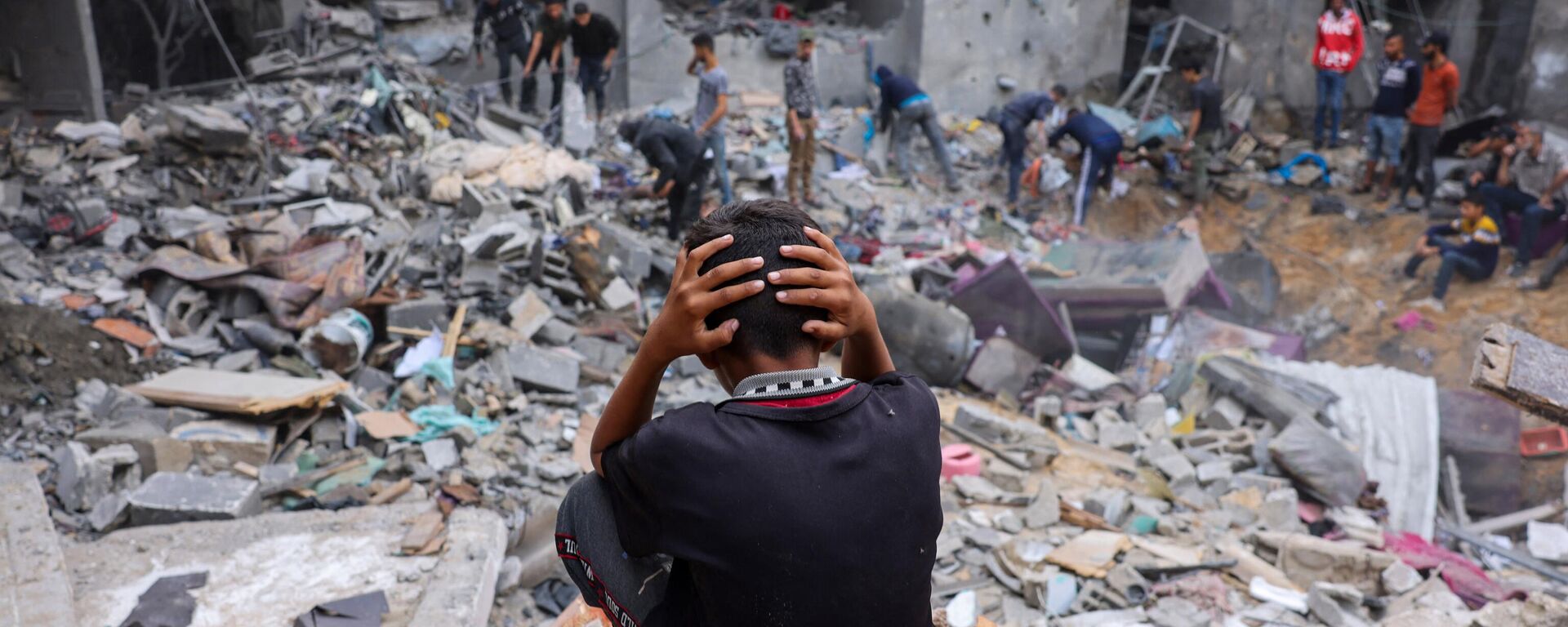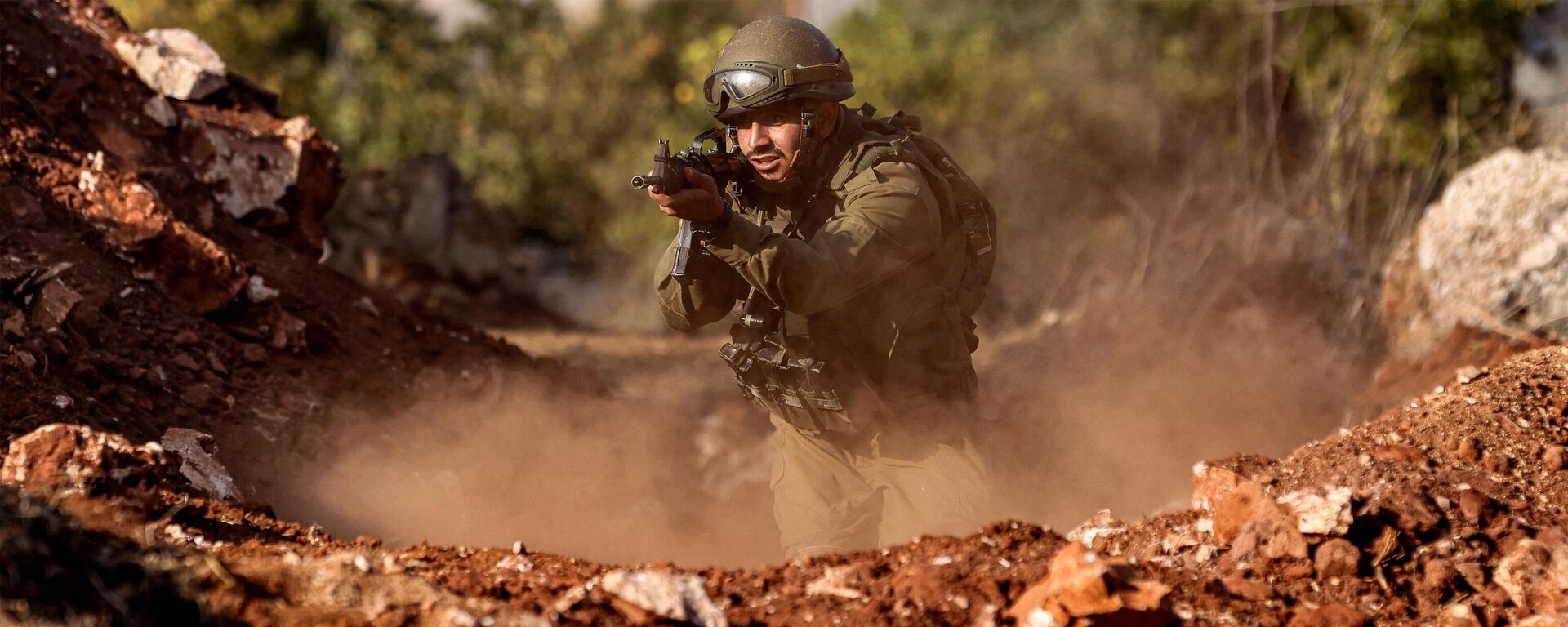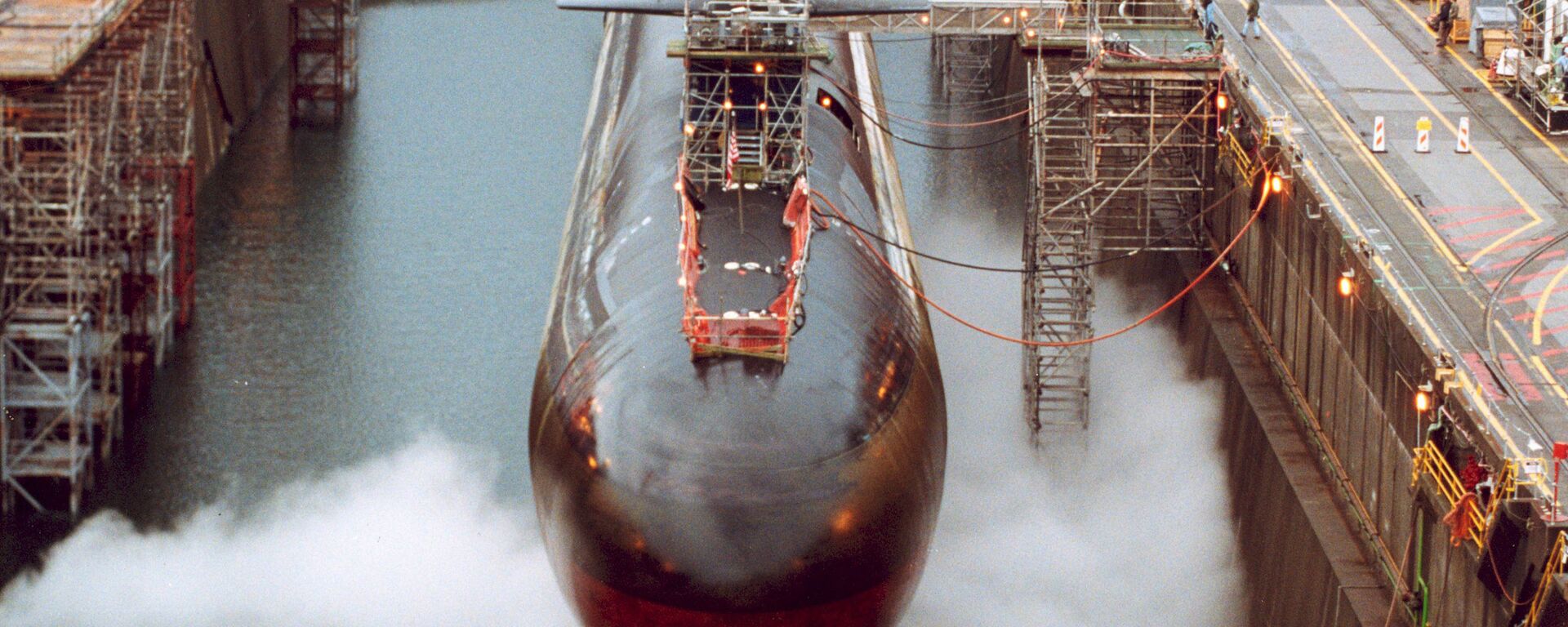https://sputnikglobe.com/20231116/bidens-dangerous-miscalculation-in-middle-east-could-spark-regional-war-1115002620.html
Biden's 'Dangerous Miscalculation' in Middle East Could Spark Regional War
Biden's 'Dangerous Miscalculation' in Middle East Could Spark Regional War
Sputnik International
The US "deterrence" in the Middle East is failing to stop the Axis of Resistance from continuing to step up pressure on Israel over the Gaza war, University of Tehran professor Seyed Mohammad Marandi told Sputnik's New Rules podcast.
2023-11-16T15:01+0000
2023-11-16T15:01+0000
2024-01-30T10:27+0000
world
opinion
seyed mohammad marandi
joe biden
americans
israel
iraq
hamas
tomahawk
iran
https://cdn1.img.sputnikglobe.com/img/105422/31/1054223138_0:164:4928:2936_1920x0_80_0_0_f5ef6abd264a0d88cb1a8d492a7fe198.jpg
US President Joe Biden voiced his approval of Israel's recent attack on Hamas' alleged command node under the Al-Shifa Hospital in Gaza on Wednesday despite international criticism and growing opposition in the Muslim world to the continuation of Tel-Aviv's ground operation in the strip.Washington's unwillingness to facilitate the cessation of hostilities may set the Middle East on a trajectory of a regional war, which wouldn't end well for the US, according to University of Tehran Professor Seyed Mohammad Marandi.Last week, the extraordinary joint Islamic-Arab Summit in Riyadh called upon the International Criminal Court (ICC) to investigate "war crimes and crimes against humanity that Israel is committing" in Gaza and placed emphasis on an immediate ceasefire.Per Marandi, the Biden administration remains vulnerable to a possible escalation as it is already losing in its proxy war in Ukraine and has significantly worsened its relations with China. A new multi-faceted conflict could add to the already fragile situation, the academic warned.The professor went on to say that the Yemeni government may also turn against the US over the latter's support to Israel's ongoing ground operation, which has claimed the lives of over 11,000 Palestinians, according to the Health Ministry of Gaza's Hamas government.Marandi does not rule out that the US military in the Persian Gulf could also become a target in the event of a major escalation. Likewise, the transportation of energy commodities, oil and gas, through the region could be also affected, leading to nothing short of a global economic meltdown, the expert said, warning that the global economy is already in a bad shape."So the worse the situation gets, the more intense the fighting becomes. We also see a rise in the strikes against the illegal American bases in Syria and American bases in Iraq. And those will become more intense if there's further escalation. You have Yemen. There are many things that can happen. It doesn't have to be in one stage," he continued.The academic pointed out that the US military buildup in the Eastern Mediterranean, Red Sea and the Middle East is unlikely to prevent the escalation. In the wake of Hamas' surprise operation on October 7 that saw massive rocket attacks against Israeli civilians and military, and hostage-taking, the US resorted to an unprecedented military buildup.In particular, Washington dispatched two aircraft carrier strike groups, with roughly 7,500 personnel on each; two guided missile destroyers; nine air squadrons; and 4,000 troops, all in addition to roughly 30,000 troops already stationed in the region; several dozen Special Ops commandos; and a Tomahawk-carrying Ohio-class guided missile submarine (SSGN). Still, the US military presence is unlikely to restrain the 'Axis of Resistance', per Marandi. The only thing to stop a broader regional confrontation is an urgent ceasefire in Gaza, he underscored.
https://sputnikglobe.com/20231115/nearly-7-in-10-americans-support-ceasefire-in-gaza-poll-finds-1114989603.html
https://sputnikglobe.com/20231114/what-are-hamas-survival-odds-as-israeli-military-gains-ground-in-gaza-city-1114957823.html
https://sputnikglobe.com/20231106/what-message-does-us-tomahawk-carrying-submarine-send-amid-gaza-war-1114768378.html
israel
iraq
iran
yemen
gaza strip
palestine
Sputnik International
feedback@sputniknews.com
+74956456601
MIA „Rossiya Segodnya“
2023
News
en_EN
Sputnik International
feedback@sputniknews.com
+74956456601
MIA „Rossiya Segodnya“
Sputnik International
feedback@sputniknews.com
+74956456601
MIA „Rossiya Segodnya“
israel, gaza, gaza strip, hamas, israel-hamas war, israel ground operation in gaza, hamas tunnels, extraordinary joint islamic-arab summit in riyadh, war crimes, palestinians, israel-palestinian conflict, casualties, hamas surprise attack, regional war, escalation in middle east, iran, yemen, houthi fighters, shiite militants
israel, gaza, gaza strip, hamas, israel-hamas war, israel ground operation in gaza, hamas tunnels, extraordinary joint islamic-arab summit in riyadh, war crimes, palestinians, israel-palestinian conflict, casualties, hamas surprise attack, regional war, escalation in middle east, iran, yemen, houthi fighters, shiite militants
Biden's 'Dangerous Miscalculation' in Middle East Could Spark Regional War
15:01 GMT 16.11.2023 (Updated: 10:27 GMT 30.01.2024) US "deterrence" in the Middle East is failing to stop the 'Axis of Resistance' from continuing to step up pressure on Israel over the Gaza war, University of Tehran Professor Seyed Mohammad Marandi told Sputnik's New Rules podcast.
US President Joe Biden voiced his approval of Israel's recent attack on Hamas' alleged command node under the Al-Shifa Hospital in Gaza on Wednesday despite international criticism and growing opposition in the Muslim world to the continuation of Tel-Aviv's
ground operation in the strip.
Washington's unwillingness to facilitate the cessation of hostilities may set the Middle East on a trajectory of a regional war, which
wouldn't end well for the US, according to
University of Tehran Professor Seyed Mohammad Marandi."I think we are heading towards escalation," Marandi told Sputnik. "It's not inevitable, but it looks like that's where we're going. And ultimately, if it escalates too much, then we can reach the stage where we have a regional war. But I think it will be a bit difficult for the Americans to move in that direction because a regional war would mean that American assets across the region will be targeted. And that means Iraq, Syria, Lebanon, the Red Sea, and the Persian Gulf. It would not be a win for the United States. It would be a defeat."
Last week, the extraordinary joint Islamic-Arab Summit in Riyadh called upon the International Criminal Court (ICC) to investigate "war crimes and crimes against humanity that Israel is committing" in Gaza and placed emphasis on an immediate ceasefire.

15 November 2023, 22:01 GMT
Per Marandi, the Biden administration remains vulnerable to a possible escalation as it is already losing in its proxy war in Ukraine and has significantly worsened its relations with China. A new multi-faceted conflict could add to the already fragile situation, the academic warned.
"The United States is vulnerable across the board because the United States has illegally occupied one third of Syria," the Iranian professor said. "They are taking the oil and the wheat and exporting it. Their proxies are there to support them. So they're vulnerable in Syria. They're vulnerable in Iraq because there's a lot of outrage in Iraq and a lot of hostility in Iraq toward the United States. US bases and interests exist across the country. In Lebanon, obviously, if the United States gets involved, they have long-lasting interests there."
The professor went on to say that the Yemeni government may also turn against the US over the latter's support to Israel's ongoing ground operation, which has claimed the lives of over 11,000 Palestinians, according to the Health Ministry of Gaza's Hamas government.

14 November 2023, 19:04 GMT
Marandi does not rule out that the US military in the Persian Gulf could also become a target in the event of a major escalation. Likewise, the transportation of energy commodities, oil and gas, through the region could be also affected, leading to nothing short of a global economic meltdown, the expert said, warning that the global economy is already in a bad shape.
"I think escalation has stages," said the Iranian academic. "So already we're seeing intensified conflict a bit on the [Israeli] border with Lebanon. We've seen that over the last couple of days, the two sides have been hitting each other much harder. And of course, the Israeli regime is hurt much more than the Lebanese because they have much more infrastructure. They have much more to lose in this exchange. So their infrastructure is being targeted. Their soldiers are being targeted at a time when they are fighting a war in the south."
"So the worse the situation gets, the more intense the fighting becomes. We also see a rise in the strikes against the illegal American bases in Syria and American bases in Iraq. And those will become more intense if there's further escalation. You have Yemen. There are many things that can happen. It doesn't have to be in one stage," he continued.

6 November 2023, 16:12 GMT
The academic pointed out that the US military buildup in the Eastern Mediterranean, Red Sea and the Middle East is unlikely to prevent the escalation. In the wake of Hamas' surprise operation on October 7 that saw massive rocket attacks against Israeli civilians and military, and hostage-taking, the US resorted to an unprecedented military buildup.
In particular, Washington dispatched two aircraft carrier strike groups, with roughly 7,500 personnel on each; two guided missile destroyers; nine air squadrons; and 4,000 troops, all in addition to roughly 30,000 troops already stationed in the region; several dozen Special Ops commandos; and a Tomahawk-carrying Ohio-class guided missile submarine (SSGN).
Still, the US military presence is unlikely to restrain the 'Axis of Resistance', per Marandi. The only thing to stop a broader regional confrontation is an urgent ceasefire in Gaza, he underscored.
"The only thing that can end this is a ceasefire. Nothing else is acceptable. US aircraft carriers have no impact on the resistance. US nuclear submarines, they have no impact on the decision-making process. They are misleading themselves, the Americans, if they think otherwise. And that's a dangerous miscalculation. The only thing that is important is that the war in Gaza ends," Marandi concluded.





